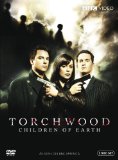| Reviews & Columns |
|
Reviews DVD TV on DVD Blu-ray 4K UHD International DVDs In Theaters Reviews by Studio Video Games Features Collector Series DVDs Easter Egg Database Interviews DVD Talk Radio Feature Articles Columns Anime Talk DVD Savant Horror DVDs The M.O.D. Squad Art House HD Talk Silent DVD
|
DVD Talk Forum |
|
|
| Resources |
|
DVD Price Search Customer Service #'s RCE Info Links |
|
Columns
|
|
|
Torchwood: Children of Earth
BBC Worldwide // Unrated // July 28, 2009
List Price: $29.98 [Buy now and save at Amazon]
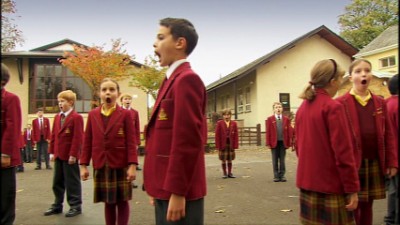 "We are coming."
"We are coming."When the beloved but only moderately successful "Doctor Who" spin-off "Torchwood" wrapped its second series in April 2008, fans were treated to some double-edged news: the series had been picked up for a third season, and would finally graduate to BBC One (the previous series had aired on BBC Three and BBC Two, respectively) - but the show wouldn't return until July 2009, and it would only be back for five episodes.
Was the Beeb putting the franchise on notice? After all, despite strong showings for both previous season premieres, the show had a habit of slumping in the ratings as episodes wore on. This truncated third series, then, could be seen as something of a last chance.
It paid off. Creator Russell T. Davies turned the third series into a pull-out-the-stops five-part miniseries event titled "Torchwood: Children of Earth," to be broadcast on five consecutive nights (a system repeated when BBC America imported the season Stateside a couple weeks later). There would be no room for the show to lose steam, especially with the story designed to increase in tension throughout. The season would be, in effect, a mammoth five-hour epic drama.
And to help with audience reception, the tale would require minimal knowledge of previous seasons or the "Doctor Who" universe in general, yet not be so blatant in its exposition as to bore longtime fans. (The fans would still be rewarded with minor touches that play off what we know about these characters, but not in a way that would alienate newcomers.) And just to be safe, the script would wrap everything up in the form of a series finale just in case ratings didn't pick up, offering a satisfying conclusion to both fans and newbies, who could view the five episodes as a self-contained adventure. (How clever it is to see a final scene that closes the book so perfectly yet still allows fans to read it as a set-up for the upcoming "Doctor Who" specials due later this year. The series' epilogue serves triple duty, and does it so damn perfectly.)
Davies plotted the story and shared scripting duties with franchise regular James Moran and "Torchwood" rookie John Fay. The trio have concocted one of the finest, smartest, and most ingenious sci-fi tales of modern times, kicking right off with a hell of an idea: one morning, every child on the planet stops moving, as if frozen in time, for just a minute. They have no memory of the experience, no idea it even happened, except for the concerned looks from parents and teachers. Later the same morning, it happens again, but this time, they begin to speak, in English and in unison, repeating a single phrase around the world: "We are coming."
If you're new to "Torchwood," or have yet to encounter this series, that's all you need to know. "Children of Earth" succeeds thanks in great part to its ability to surprise - not "twists," mind you, but in the way it's able to reveal its secrets - its magnificent, shocking, brilliant secrets - gradually as the five hours unfold. The series engages you with every turn, and the less you originally know, the more you'll be involved.
So simply note that "Children of Earth" is an absolute masterpiece of storytelling, and then turn away from the rest of this review. For there is much more that demands to be discussed of this series, so from here on out, we'll be in massive Spoiler Alert territory, including mentions of just about every surprise the show offers. You've been warned.
Still with me? Alright, then, let's get back to it...
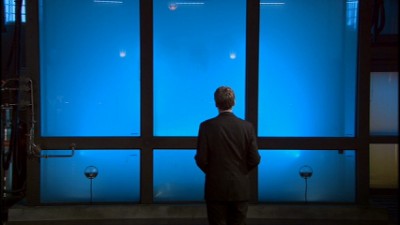 Of all the smart things the writers do here, one of the smartest is in how they allow the characters to evolve beyond what we've previously come to know about them. This may not matter much to newcomers, but established fans will hopefully recognize that this is how a program remains fresh over the years. We're given new revelations about all three surviving Torchwood agents: Captain Jack Harkness (John Barrowman), Gwen Cooper (Eve Myles), and Ianto Jones (Gareth David-Lloyd).
Of all the smart things the writers do here, one of the smartest is in how they allow the characters to evolve beyond what we've previously come to know about them. This may not matter much to newcomers, but established fans will hopefully recognize that this is how a program remains fresh over the years. We're given new revelations about all three surviving Torchwood agents: Captain Jack Harkness (John Barrowman), Gwen Cooper (Eve Myles), and Ianto Jones (Gareth David-Lloyd).The most obvious change is the discovery that Gwen is pregnant. Gwen started the show as the most relatable character, an outsider with a kind heart; for series three, she's become a little colder and much more aggressive. Her pregnancy requires her to confront her future - not only in the simple terms of being a mother and a soldier, but in a grander scale of bringing a child into a world that's so cruel. The sickening callousness Gwen uncovers as this series unfolds turns her into a biting cynic, which raises the question of abortion. Her husband Rhys (Kai Owen) wants the baby, but Gwen makes it known that it's to be her decision.
(How wonderful it is to see a female character as strong as Gwen on television; how more wonderful still to see such great complexities in the role, the writers refusing to settle on letting a single aspect of her adventures define her. Other series might just settle on "gun-toting babe" or even just "bitch" as some sort of lame shorthand for "strong woman character," but "Torchwood" allows Gwen to be much more, a woman of action who also has a complex personal life. Heck, she's more properly developed than most male characters on TV, too.)
As we see in the fifth episode's epilogue, Gwen opts to have the baby. Would the decision have meant as much - or anything at all - had she not gone through so much doubt? Not really. Even newcomers to the show will see how much compassion she has (watch how gently she cares for Clement McDonald, the disturbed abduction survivor played by Paul Copley; that sympathy is the heart of the character right there), so without the inner conflict, she'd just be a nice lady who's now pregnant. With the conflict, though, we get to see how her adventures with Torchwood have taken her to the brink, and she's strong enough to pull herself back.
Captain Jack, meanwhile, has spent decades (centuries?) living in the brink. Although his transformation into an immortal being in the "Doctor Who" episode "The Parting of the Ways" wrapped up what was then seen as an equal transformation from conman/scoundrel to hero of sorts, and despite his seeming love for life (and life forms; Jack's raging omnisexuality is perhaps his most notorious - and endearing - trait) making him appear to be a happy free spirit, we discover just how often Jack has managed to bury his humanity. Having seen so many he's loved age and die while he remains ageless and alive, a certain coldness has crept in, feeding off his innate selfish nature.
We discover Jack has a grown daughter, Alice (Lucy Cohu), and a young grandson, Steven (Bear McCausland). This alone is enough of a revelation to shake the series to the bone, but it goes further. Dialogue tells us secrets have been kept to protect Steven from the truth about Jack's immortality (the boy has been told that Jack is his uncle), and Alice is verbal about her contempt for Jack, who's always been an absent father who always placed his own interests above hers.
And that's enough drama to propel the story forward at a remarkable pace - but there's more. Alice warns that Jack is a "dangerous" man, and that "a man who cannot die has nothing to lose." Is she merely hoping to frighten the villains who have kidnapped her? Or is there another implication there, that she fears him as well? Could a man with nothing to lose also have nothing to live for, nothing to connect him to this world?
After all, Jack has seen loved ones die before, and he knows he'll see them again - that's enough to drive anyone to inward isolation. A conversation between Jack and Ianto brings home the point. Ianto, who perhaps never properly imagined the vast life Jack had in the centuries before they met, has become overwhelmed with the thought of Jack outliving him, leaving Ianto only a memory. Jack can offer nothing but comfort and the truth that yes, this is how it will be.
We also discover that Ianto has never told his sister (Katy Wix) or her family about his romance with Jack. It's a puzzle to them - he was straight last time they talked (and had a girlfriend in the show's first series). Can Captain Jack really have that much influence on one's sex drive? (Answer: yes.)
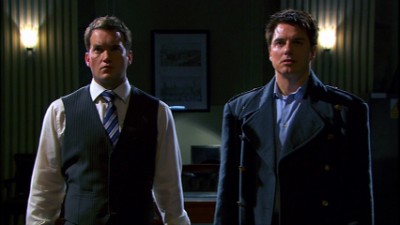 Ianto's family serves to underline many of the series' dramatic themes, eventually making her and her husband (Rhodri Lewis) our focal point for the nationwide theft of children (their attempts to hide the neighborhood kids from the military hits a nerve, making real all the previous talk of forcibly removing children from their parents; it's one of the most frightening sequences in a series filled with terror). But more importantly, they also serve to humanize Ianto, rounding out the character, endearing us to him - which then allows for a greater reaction when he's killed at the end of the fourth episode.
Ianto's family serves to underline many of the series' dramatic themes, eventually making her and her husband (Rhodri Lewis) our focal point for the nationwide theft of children (their attempts to hide the neighborhood kids from the military hits a nerve, making real all the previous talk of forcibly removing children from their parents; it's one of the most frightening sequences in a series filled with terror). But more importantly, they also serve to humanize Ianto, rounding out the character, endearing us to him - which then allows for a greater reaction when he's killed at the end of the fourth episode.His death works not just because we've come to love the character, both in this series and throughout the previous series as well, but because, as written, it takes us back to that earlier scene between Ianto and Jack. As he lies dying in Jack's arms, all of his earlier fears now swarm into being. David-Lloyd's performance is outstanding in its naked emotion: we sense his unbearable fear, not of death, but of being forgotten by the man he loves.
Ianto's death caused an uproar in the fan community. Moran, who scripted episode four, found himself inundated with hate messages on his blog as fans - the sort that obsess so much over character relationships to the point they lose track of the rest of the drama - accused him of everything from "ruining the show" to "homophobia." (Davies joked that those insisting on the latter hadn't done their homework; the openly-gay Davies previously created "Queer as Folk.")
Oh, but how this misses the point entirely. If people only want stories about how their favorite characters love each other and nothing bad ever happens except for a few none-too-threatening run-ins with aliens and monsters, they should stick to fan fiction. What the writers do here is personalize the threat as a means of upping the stakes. Where's the tension in an adventure where nobody gets hurt? Killing off Ianto makes the danger all too painfully real while simultaneously adding depth to both his character (his farewell monologue ties up four episodes of emotion and growth) and, possibly far more importantly, Jack's.
Indeed, the entire five-episode arc builds slowly to Jack's most terrible decision. Over the course of the series, we've cut away to London, where Home Office bureaucrat John Frobisher (Peter Capaldi), Prime Minister Brian Green (Nicholas Ferrell), and others meet the strange aliens known only as "the 456." Slow reveals inform us that in 1965, the 456 strong-armed the British government into giving them twelve children, and Jack was among those that followed through, the decision being the loss of twelve orphans - no one would miss them, so the justification went - was an acceptable price to pay to keep the 456 from killing millions.
Now they're back, and they're demanding ten percent of the world's children population; failure to comply will result in the extermination of every human on the planet. In London, the elected officials and civil servants debate if such an exchange is allowable, and if so, which children are selected? (The ensuing sequence, with a roomful of top actors arguing about the fate of an entire generation, is a reminder of science fiction at its very best, as a genre of ideas, compelling and challenging. This is some of the sharpest - and most unsettling - dialogue the genre has ever produced.)
But Jack, long ago at the core of a similar question, knows where he now stands. Or does he? Ah, that's the trick of this series. Jack is haunted by his shameful past, and it's a past he cannot escape once he encounters Clement, who survived the abduction. Clement turns our hero into his villain ("You are in every nightmare I've ever had," he bluntly tells Jack), and a flashback reveals a Jack who was once legendary for his ruthlessness (when asked why he was chosen for the job, he's told, "We need someone who doesn't care"). He hopes to atone by refusing to submit to the 456's new demands, and the story sweeps us along with him: yes, the notion that sacrificing the few to save the many has its limits, and it's time to take a stand.
The reveal that the 456 use children as a sort of drug, the kids suspended eternally in a state of shock just so the aliens can "feel good," leaves us all the more convinced: they do not deserve a single child, let alone their precious ten percent.
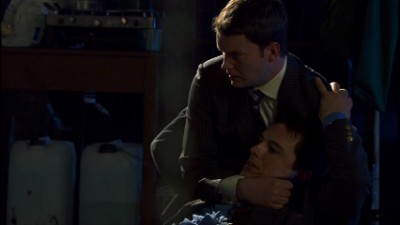 But just when we've become so confident in this belief, the fifth episode springs its trap. With the assistance of technical genius Mr. Dekker (Ian Gelder) - who's equally coldhearted in his approach to the matter, to the point of gallows humor - Jack uncovers a method to destroy the aliens, but it will require the death of a single child. Surely the salvation of billions is enough to justify the sacrifice of one, and Jack can safely stand by such a thought. Except the only available child is Stephen.
But just when we've become so confident in this belief, the fifth episode springs its trap. With the assistance of technical genius Mr. Dekker (Ian Gelder) - who's equally coldhearted in his approach to the matter, to the point of gallows humor - Jack uncovers a method to destroy the aliens, but it will require the death of a single child. Surely the salvation of billions is enough to justify the sacrifice of one, and Jack can safely stand by such a thought. Except the only available child is Stephen.It comes down to this. It's easy to take the "sacrifice one, save many" position as a hypothetical, or even from a safe distance - aren't all moral decisions made all the simpler when it's someone else's son? Now, in a particularly vicious act of karma, Jack not only must return to the original decision that haunts him, he must place his own family at its center.
The scene, with Barrowman's Jack shutting off his emotions and Cohu's Alice screaming for mercy, is brilliantly played in its psychological brutality, the entire last half of the final episode leaving the viewer shell-shocked and numb. And it changes the Jack character forever, at least we assume; in the epilogue, he remains so torn that he flees the planet entirely, running away (forever?) from the terrible decisions he can never escape.
And so the question becomes: would Jack have killed Stephen had Ianto lived? Not likely. Not a chance. Ianto was Jack's emotional anchor, a reminder of the good in humanity; his death is the trigger the character needs to make such an awful choice. It's also perhaps the trigger Gwen needs to regain faith in the world around her, as the death leads her to Ianto's family, and she can see the good in their hearts that pervades even in the shadow of such great fear.
For all this character study driven into the heart of the action, "Children of Earth" also grants itself the time to become more involved with supporting cast, most notably Frobisher. Capaldi delivers a hell of a performance here; we first see his paper-pusher as a symbol for the selfish cruelty of a secretive government - he's the one who orders assassins to kill Captain Jack, only to protect state secrets about the previous 456 meeting, and many meetings between himself and the Prime Minister involve plans on how to cover one's ass, politically speaking. As the story progresses, however, we become sympathetic to this civil servant stuck way over his head who's eventually betrayed by his own people (to cover their asses, politically speaking), and his tragic final scene hits just as hard as any involving the regular cast. Few genre programs would allow for such depth and compassion to be aimed at a character that's essentially a side villain.
The series is clever with all its secondary characters, sometimes to the point of playful misleading. The first episode sets us up to accept two new characters - E.R. doctor Rupesh Patanjali (Rik Makarem) and personal assistant Lois Habiba (Cush Jumbo) - as possible additions to the permanent cast. After all, as a series premiere that's following a finale that killed off two regulars, fans are expecting replacements to be written in fairly early. While Lois does become an integral part of the team, Rupesh is one big red herring, for both us and Torchwood. He's been set up to infiltrate the team, and like Jack and Ianto, we follow his bull willingly. It's a mischievously witty turn of events hinting at more cleverness to come.
Indeed, there's plenty of lightheartedness sprinkled throughout the series - much needed, considering how dark things get, and how often. The action is brisk and exciting, and in terms of Ianto's goofy-but-daring forklift rescue of Jack in episode two, cause for all-out cheering. This "Torchwood" is not afraid to mix shoot-outs and explosions in with the intellectual arguments, preferring to be fun as well as thought-provoking.
But, of course, the thought-provoking is what we'll remember most. "Children of Earth" is unapologetic in its intelligence, daring the viewer with moral ambiguity and one devious dilemma after another. The 456, hidden behind poisonous gas and wails of terror, might be enough of a horrific monster to unnerve even the strongest of heart, but it's the maneuvers of humanity itself that delivers the biggest chills.
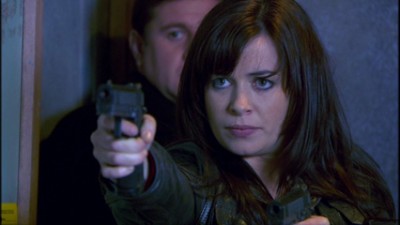 The (Spoiler Free!) DVD
The (Spoiler Free!) DVDBBC Video collects all five hour-long episodes of "Torchwood: Children of Earth" in a two-disc set.
Video & Audio
"Torchwood" has always been shot in hi-def, and this brilliant 1.78:1 anamorphic widescreen transfer makes the most of it. The picture here is glorious, revealing the tiniest of detail, enveloping us in deep blacks and rich, strong colors. This thing looks downright gorgeous.
It sounds gorgeous, too, with a Dolby 5.1 soundtrack that lets the dialogue pop, the music overwhelm, the effects chill. (Oh, how those 456 screams terrify in full surround!) Optional English subtitles are provided.
Extras
Even though the quick turnaround from broadcast to disc likely prevented the staff from compiling proper bonus material, I was hoping for much more. Sadly, the only extra offered is the thirty-minute featurette "Torchwood: Declassified." It's a decent making-of, with a few nifty behind-the-scenes goodies. (For all the fright of the 456's convulsions, it turns out it's just a guy whapping some rubber onto a sheet of glass.) But the program quickly devolves into a collection of cast and crew interviews where they merely run down the story and offer their thoughts on each major development, sort of a Cliff's Notes for the series. They even pause for a tribute video to one character, the sort of cheesy montage you'd find fan-made on YouTube.
A trailer for other "Torchwood" DVDs and a promo for BBC America plays as Disc One loads; a trailer for "Primeval" plays as Disc Two loads.
Final Thoughts
Good news! "Torchwood: Children of Earth" performed well enough that the BBC has just announced it will indeed return for a fourth series. And it's no surprise, really - "Children of Earth" is inarguably one of the finest science fiction works I've ever encountered. The performances are uniformly brilliant, the writing is phenomenal, the direction slick and always on the mark. The tension is unbearable, but ultimately rewarding, while repeat viewings reveal minor touches that go unnoticed the first time around. This set is Highly Recommended without question - the only thing keeping it from the DVD Talk Collector Series are the limited extras.
|
| Popular Reviews |
| Sponsored Links |
|
|
| Sponsored Links |
|
|
| Release List | Reviews | Shop | Newsletter | Forum | DVD Giveaways | Blu-Ray | Advertise |
|
Copyright 2024 DVDTalk.com All Rights Reserved. Legal Info, Privacy Policy, Terms of Use,
Manage Preferences,
Your Privacy Choices | |||||||









